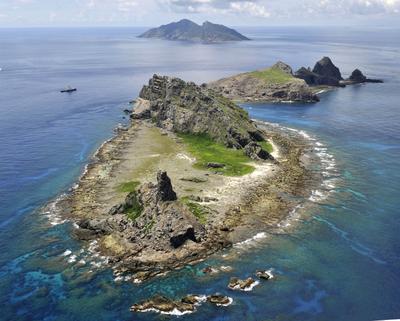Japan, in turn, has abandoned its previous stance of not responding to Chinese claims and started promoting its position by emphasising its identity as a peaceful and democratic state that follows international rules and norms. The public diplomacy battle continues, and just in time for his meeting with US President Barack Obama, Japanese Prime Minister Shinzo Abe increased the stakes by criticising China for its ‘anti-Japanese’ education curriculum.
China’s position, which has been asserted through a number of opinion ads in newspapers outside China, was clearly articulated when Chinese Vice-Premier Li Keqiang met with Papua New Guinean Prime Minister Peter O’Neill in September 2012: ‘Both China and Papua New Guinea were victims to the Japanese fascist invasion back in the Second World War’. Li continued: ‘Japan’s position today on the issue of the Diaoyu Islands is an outright denial of the outcomes of victory in the war against fascism and constitutes a grave challenge to the post-war international order. No nation or people who are peace-loving and justice-upholding will tolerate Japan’s stance’. O’Neill reportedly replied: ‘Japan’s move cannot be accepted by the international community’.
In this way, the territorial row is depicted as more than a bilateral issue between China and Japan. Instead, China is attempting to draw a line between Japan and the international community, similar to the one that existed during World War II. China’s way of stepping up public diplomacy efforts might be seen as a response to the Japanese government’s nationalisation of the islands in September 2012.
In response, the Japanese government, while still denying the existence of a territorial dispute, decided to abandon its previous policy of not commenting on Chinese claims. In statements and position papers, it stresses Japan’s identity as a peaceful and democratic country as well as the need to deal with the issue without resorting to violence. This democracy narrative serves to differentiate Japan from China.
In an interview with the Washington Post published just before his recent visit to the United States — timing that ensured wide public dissemination of his comments — Prime Minister Abe took these efforts further by suggesting that China’s behaviour in territorial conflicts is related to the Chinese Communist Party’s sources of legitimacy, one of which is the teaching of patriotic education. According to Abe, ‘the mood and atmosphere created by the education in China attaching importance on patriotism — which is in effect focusing on anti-Japanese sentiment — is in turn undermining their friendly relationship with Japan’.
The statement marks a significant departure from how previous Japanese governments have dealt with the content of Chinese education. Since anti-Japanese demonstrations in China in 2005, the Japanese Foreign Ministry has discussed the content of ‘anti-Japanese’ patriotic education with its Chinese counterpart through diplomatic channels in a low-key fashion. Abe, however, in order to appeal to the international community, depicts the root cause of the territorial dispute and the bad state of Sino-Japanese relations as having to do with the Chinese government’s dependence on ‘anti-Japanese’ patriotic education. He differentiates Japan from China by explicitly portraying China as a state that, unlike democracies, relies on negative representations of its neighbour for political legitimacy.
China criticised Abe for playing ‘up the “China threat” with ulterior motives’. Exactly what these ‘ulterior motives’ were was not made clear — but having a neighbour who instils ‘anti-Japanese’ sentiments in its people might be a good reason to revise Japan’s pacifist constitution.
It remains to be seen whether the Chinese narrative emphasising war memory or the Japanese one stressing norms shared by democratic members of the international community will prevail. Abe’s statements and actions on issues related to war history, such as his apparent desire to revise the Kono and Murayama statements on Japanese war guilt, are likely to affect his credentials when it comes to championing democratic international norms. Furthermore, in the United States, Chinese-American organisations have already lobbied against him. On the other hand, for countries involved in disputes with China in the South China Sea, China’s appeals to war memory may be trumped by the Japanese emphasis on international law and norms. What is quite clear is that both sides have stepped up their public diplomacy efforts in an attempt to gain sympathy from the international community. This in itself is likely to have a negative impact on bilateral relations.
Karl Gustafsson is a Postdoctoral Fellow at Lund University, Sweden.


This is a timely article, but I should point out that the only instance cited of China’s efforts to make the Diaoyu/Senkaku-WWII link meeting with any success is Papua New Guinea. That doesn’t mean much period, but it’s even less credible given the extensive history the PRC (and ROC) using development dollars to purchase influence in Oceania, usually over the Taiwan sovereignty/diplomatic recognition issue.
You are of course right. However, my argument is that China and Japan have intensified their public diplomacy efforts in order to gain sympathy from the international community for their claims. Whether or not these attempts are successful is quite a different matter. It would certainly be interesting to read research that explores whether these efforts produce effects, for example in changes in public opinion. I think it is possible that neither the Japanese nor the Chinese efforts are successful if interpreted as one-sided propaganda. Either way, the intensification of these efforts will not make it easier to solve the dispute. Instead, it is likely to cement the positions of the two sides and make it increasingly difficult to compromise. The blame game raises the stakes as it involves negative depictions of the other, which are broadly disseminated.
Daiyou/Senkaku controversy is just an excuse to fight a war. Both China and Japan have demographic and economic structural problems which war is the politically easiest solution.
http://www.emergingmarketinsider.com/why-china-and-japan-are-likely-going-to-war/